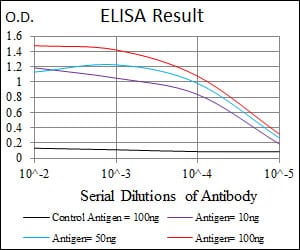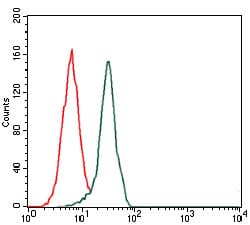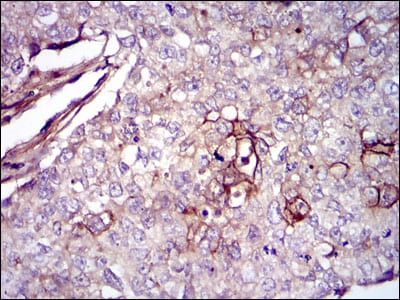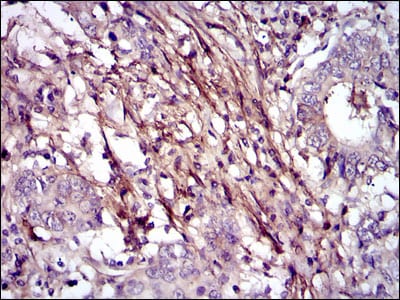



| WB | 咨询技术 | Human,Mouse,Rat |
| IF | 咨询技术 | Human,Mouse,Rat |
| IHC | 1/200 - 1/1000 | Human,Mouse,Rat |
| ICC | 技术咨询 | Human,Mouse,Rat |
| FCM | 1/200 - 1/400 | Human,Mouse,Rat |
| Elisa | 1/10000 | Human,Mouse,Rat |
| Aliases | FN; CIG; FNZ; MSF; ED-B; FINC; GFND; LETS; GFND2 |
| Entrez GeneID | 2335 |
| clone | 2F4 |
| WB Predicted band size | 262.6kDa |
| Host/Isotype | Mouse IgG1 |
| Antibody Type | Primary antibody |
| Storage | Store at 4°C short term. Aliquot and store at -20°C long term. Avoid freeze/thaw cycles. |
| Species Reactivity | Human |
| Immunogen | Purified recombinant fragment of human FN1 expressed in E. Coli. |
| Formulation | Ascitic fluid containing 0.03% sodium azide. |
+ +
以下是关于FN1抗体的3篇代表性文献及其摘要信息:
---
1. **文献名称**: *"Fibronectin and its receptors in angiogenesis"*
**作者**: Risau, W., et al.
**摘要**: 该研究探讨了纤维连接蛋白(FN1)及其受体在血管生成中的作用,发现FN1抗体可抑制肿瘤血管内皮细胞的迁移和黏附,提示其在抗肿瘤治疗中的潜在应用。
---
2. **文献名称**: *"Targeting fibronectin for imaging and therapy in fibrosis"*
**作者**: Sottile, J., & Hocking, D.C.
**摘要**: 研究开发了一种靶向FN1的单克隆抗体,通过体内成像技术显示其在肺纤维化模型中特异性结合病变组织,为纤维化疾病的诊断和治疗提供了新工具。
---
3. **文献名称**: *"Antibody-mediated blockade of fibronectin-Integrin α5β1 interaction reduces atherosclerosis in mice"*
**作者**: Muro, A.F., et al.
**摘要**: 通过使用FN1抗体阻断FN1与整合素α5β1的相互作用,显著减轻小鼠动脉粥样硬化斑块的形成,表明FN1抗体在心血管疾病干预中的潜力。
---
如有需要进一步补充或调整,请随时告知!
The FN1 antibody targets fibronectin (FN1), a high-molecular-weight glycoprotein critical for cell adhesion, migration, and differentiation. Fibronectin exists in soluble plasma and insoluble cellular forms, both derived from alternative splicing of the FN1 gene. It plays a key role in extracellular matrix (ECM) organization, wound healing, embryogenesis, and maintaining tissue integrity by interacting with integrins, collagen, and other ECM components. FN1 dysregulation is linked to fibrosis, cancer metastasis, and vascular diseases, making it a biomarker in pathological studies.
FN1 antibodies are widely used in research to detect fibronectin localization, expression levels, and structural variants. They aid in studying ECM remodeling in cancer progression, tissue repair, and fibrotic disorders via techniques like Western blot, immunohistochemistry, and immunofluorescence. Monoclonal FN1 antibodies offer high specificity for distinct epitopes or isoforms, while polyclonal versions detect broader epitopes, enhancing sensitivity for fragmented or denatured fibronectin. Validation often involves knockout controls or recombinant protein assays to ensure minimal cross-reactivity. Commercial FN1 antibodies are typically generated using recombinant fragments or purified fibronectin, with applications spanning basic research, diagnostics, and therapeutic development targeting ECM-related pathologies.
×